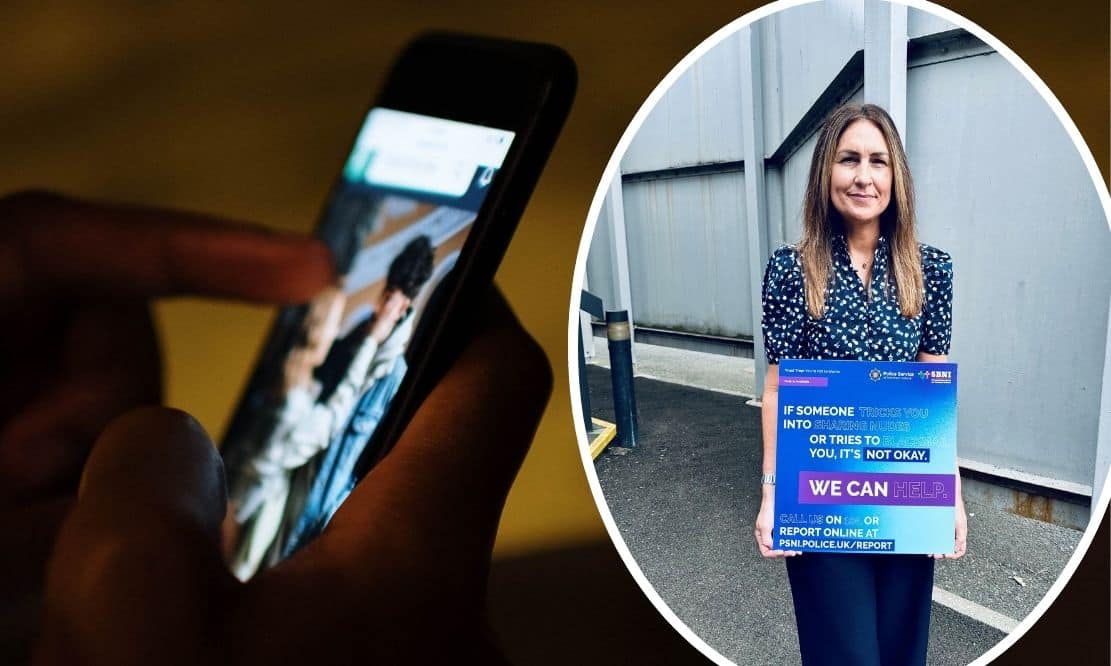
The Police Service of Northern Ireland and the Safeguarding Board for Northern Ireland (SBNI) have teamed up to raise awareness of the dangers for children online with a victim of convicted Lurgan serial online groomer Max Hollingsbee speaking publicly to support the campaign.
In November 2024, the BBC, with support from the PSNI, aired a documentary series called Teen Predator/Online Killer about prolific online child groomer and abuser Alexander McCartney from Newry.
This case led to the death of a 12-year-old girl in America who took her own life after being targeted and abused by McCartney.
With the permission of the BBC, clips from this series have now been made available for a social media campaign – funded by SBNI – to raise awareness to more young people about how these predators are operating in online spaces and to encourage more victims to report.
Sadly, online sexual offences against children are becoming an increasing crime type in Northern Ireland.
There were 2,187 sexual offences against children recorded in 2024, 187 of which relate to grooming and sexual communication with a child.
799 offences relating to taking, possessing, sharing or publishing indecent images of children were reported in 2024.
Immy (not her real name), was 15-years-of-age when she was targeted by convicted serial online groomer Max Hollingsbee, of Lurgan.
She was the first to come forward and report to police, launching an investigation uncovering 13 more victims. She is now speaking out publicly to support the campaign in raising awareness of predators in online spaces.
She says: “When I got added on Wizz from someone I didn’t know personally I thought nothing of it, it is pretty normal for young people to add people from ‘suggested friends’ lists.
“At the time I was a relatively awkward 15-year-old girl, I struggled to make friends and didn’t have much self-confidence. When this good looking guy my age showed interest in me and complimented me, I felt special. But, it went zero to 100 within one day of chatting.
“The compliments quickly turned sexual and he suggested sending intimate images of each other. He made me feel like he would lose interest if I didn’t, he promised it was only between me and him. Once I sent him an image, he switched. Started blackmailing and threatening to share them with my friends if I didn’t send him more and do more for him.
“He had convinced me prior to the blackmailing that I should allow him to enter my snapchat account without reporting him and I did because of his grooming however he did end up sending my images to a close female friend of mine. I felt like the world was collapsing around me, I blacked out during this time and have holes in my memory.
“I ran into my mum’s room and just remember collapsing into her arms and crying. I showed her what was going on and just remember crying on a ball on the floor of her room. I didn’t really know what was happening or what to do. If I hadn’t of told my mum, I dread to think what would have happened next.
“Although I was so embarrassed to show my mum I have never regretted for a second speaking out and getting help. Both her and the police were incredible, not judgmental at all. By being the first of his victims to speak out, others were discovered and came forward and I feel like we prevented more children from being targeted.
“He made the mistake of giving me his real phone number and through the app ‘BeReal’, his real profile and name ‘Max’ came up on my ‘suggested friends’ list. I told the police immediately. When I found out he’d been arrested, charged and then later sentenced, I felt a huge wave of relief and I was proud of myself for being brave.
“People like him target young teenage girls and boys because they are paedophiles, yes, but also because you are more vulnerable. I was just coming to terms with who I was then, my body, my sexuality. He played on all my insecurities. He was clever in his approach and knew exactly what to say and how to act. It’s scary how clever these people can be.
“I support this campaign because I think more young people should know that not everyone online is who they say they are. What happened to me should never happen to you, but if it does – speak out! The police can and will help you. As a child or teenager, you’re not going to be thinking rationally in that situation, I wasn’t. A trusted adult or the police will know what to do to keep you safe. I have been to therapy and am taking steps to tackle my anxiety, I start university soon. It does get better.”
Detective Superintendent Jordan Piper from the Police Service of Northern Ireland’s Public Protection Branch said: “Groomers like McCartney and Hollingsbee operate in a very similar way, concealing their identity online pretending to be the same age as a child. They use fake profile pictures, pretending to have similar interests to gain the trust of the child before steering the conversation to a sexual nature.
“Once trust in established, they use power and control to make, force, blackmail, guilt or trick a child into doing what the groomer wants. They may persuade a child to take part in online sexual activity including sharing explicit images and videos and livestreaming sexual acts.”
Recognising the signs of online grooming can be hard as often child predators are incredibly manipulative and tell children not to talk to anyone about it. Sometimes children don’t realise they’ve been groomed and may believe they are in a ‘relationship’.
Signs a child may be being groomed include:
• Sudden changes in behaviour, such as spending more or less time online
• Spending more time away or going missing from home or school
• Being secretive about how they’re spending their time, including online
• Having unexplained gifts, big or small
• Misusing alcohol and/or drugs
• Having a friendship or relationship with a much older person
• Developing sexual health problems
• Using sexual language you wouldn’t expect them to know
• Seeming upset, worried, sad, withdrawn, angry, stressed, anxious or depressed
Online grooming can happen on social media and messaging apps, dating sites, chat rooms or via online games.
Independent Chair of the Safeguarding Board for Northern Ireland, Bernie McNally said: “No child should ever feel alone, afraid or manipulated by someone hiding behind a screen. Yet every day, online predators exploit the trust and innocence of young people, often in silence and secrecy. This campaign is a vital reminder of the urgent need for education, vigilance and open, honest conversations with our children.
“Our message is clear: let your child know they can always come to you, especially if someone pressures them to share images or videos. And if a child has been made to do something they didn’t want to online, they are not to blame, they are not in trouble, and they are not alone. Support is available.”
Detective Superintendent Piper continues: “It is a crime for anyone to possess, make, distribute or show anyone an indecent image of a child under 18 years of age. This offence can be committed by an adult or a child. It is also a crime for an adult to send a sexually explicit image of themselves to a child.
“We have specialist detectives within the Child Internet Protection Team who are dedicated to robustly investigating those who contribute to the cycle of child abuse and bringing those responsible before the courts. We use specialist technology to examine digital devices and trace any digital interaction right back to the person, making it difficult for offenders to hide evidence from us.
“If a person is downloading, viewing or making indecent images of children, you are leaving a digital footprint and we are actively looking for you. I would encourage anyone with concerns or information to get in contact us on 101 or 999 in an emergency.”
Health Minister for Northern Ireland, Mike Nesbitt said: “Too many children and young people in Northern Ireland are being exposed to abuse and exploitation online. This campaign is an important step in raising awareness of the risks, starting vital conversations, and helping parents, carers and communities take action to keep children safe in the digital world. It is being delivered as part of the Executive’s Online Safety Strategy, which is sponsored by my department, and supported by a newly updated action plan that sets out clear commitments to tackling these harms together.”
The Child Internet Protection Team are the busiest they have ever been since their inception in 2010. In 2024, 120 searches were carried out relating to tens of thousands of indecent images of children and thousands of devices were seized. As a result of these searches, they made 43 arrests.
You can access all the campaign resources here: https://www.psni.police.uk/safety-and-support/online-safety/trust-trap
For more information and advice on how to keep your children safe online visit https://www.psni.police.uk/staysafeonline or https://onlinesafetyhub.safeguardingni.org/
The BBC documentary series can be found on iPlayer here https://www.bbc.co.uk/iplayer/episodes/m002520t/teen-predatoronline-killer






